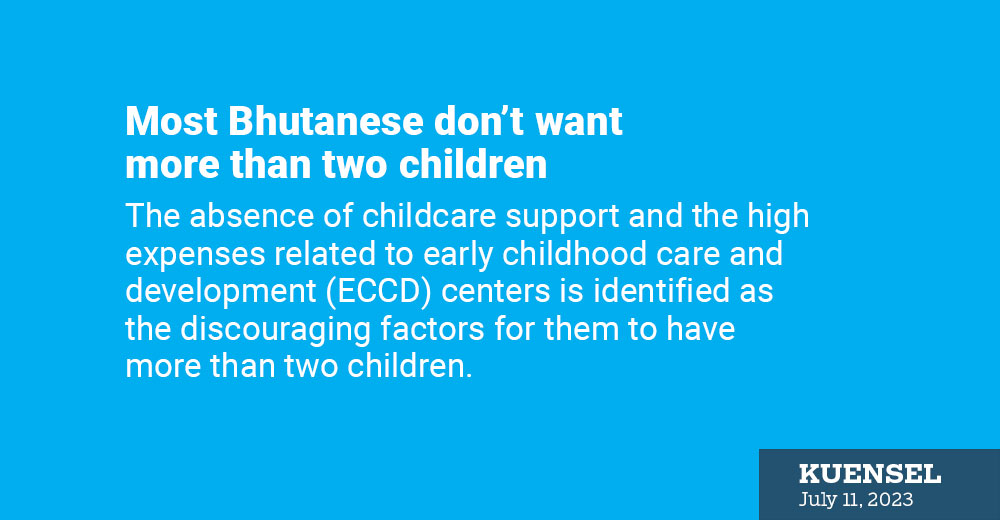Parents seek sustainable childcare support to enable them to raise children
Yangyel Lhaden
The absence of childcare support and the high expenses related to early childhood care and development (ECCD) centers is identified as the discouraging factors for them to have more than two children.
Bhutan’s fertility rate is declining, dropping from six children per woman in 1982 to 1.9 in 2017, and further decreasing to 1.8 last year. This indicates that a majority of couples are now having only one to two children. Bhutan needs at least 2.5 births per woman according to the global standard for population replacement.
A woman in her seventh month of pregnancy is already concerned about finding someone to care for her baby. Meanwhile, Tshering Delma, a working mother of one, currently pays Nu 6,000 per month for her two-year-old son’s enrollment in an ECCD centre. Her son has been attending ECCD centre since he was six months old, and she used to pay Nu 7,500 previously.
“It is a traumatic experience to be a working mother not having anyone to look after your child,” Tshering Delma said. “I have no plans for a second baby.”
Many parents who send their child to ECCD said that their primary reason for sending their child to ECCD was because of lack of caregivers. They said they cannot think of planning for more children with the scarcity of finding housemaids.
A young couple said they were not planning a child for the next two years. “We need to save enough to afford an ECCD centre since my mother is old and she has already looked after all my sibling’s children.”
A study on ECCD by the education and skills development ministry (MoESD) and UNICEF country office, 2020, pointed out that there was a disappearing traditional childcare support in urban areas with an increase in the number of working parents and emergence of nuclear families.
However, Constitution of Bhutan 2008, Article 9 on Principles of State Policy states, “The State shall endeavour to promote those conditions that are conducive to co-operation in community life and the integrity of the extended family structure.”
The study also pointed out there was a need for a conducive and stimulating environment for enhancement of emotional, intellectual, and physical development during early childhood years. Meanwhile, 132 out of 420 government ECCD centres remain closed due to shortage of facilitators. Private ECCDs in Thimphu charge between Nu 3,000 and Nu 15,000.
A banker in Sipsoo said that working parents enrolled their children in the ECCD centre in the RBA compound which was inconvenient at times. “There is a need of a private ECCD for those who can afford and government centres for those who cannot.”
She said that inadequate ECCDs are discouraging working parents to go for more than a child. “My child mostly grew behind me in the office cubicle when I couldn’t find anyone to look after her.”
Tshering Delma said that the government should bring in policies which are long-term and sustainable such as adequate ECCDs, workplace crèche, and easily-available caregivers to encourage parents to not hesitate having more children.
An official from MoESD said that population growth is crucial to a nation’s development and ECCD and workplace crèche were crucial enabling support for parents. “For the population to grow we need to support parents and for that there should be policies targeted for sustainable and meaningful services and one such is making ECCDs accessible.”
The ministry has been requesting Royal Civil Service Commission (RCSC) for recruitment of ECCD facilitators for years. The latest request the ministry submitted to RCSC proposes recruitment of 156 ECCD facilitators. It is being reviewed by the Cabinet Secretary.
“ECCD contributes to nations wealth because ECCD helps in development of children in their first five years,” the official said. “When a child goes to ECCD, it reduces failures in children at a later stage which in turn saves the cost of the nation, parents, and saves the child from emotional and psychological trauma.”
RCSC started paying Nu 10,000 to every civil servant on the birth of a child under the Civil Servant’s Welfare Scheme from last year.
A civil servant said that Nu 10,000 was not targeted to increase the birth rate. “There should be long-term sustainable approaches to enable parents to raise their children.”
Needrup Zangpo, a non-governmental organisation professional said that globally, fertility rate decreased with the level of education especially in women and more educated women were less likely to marry or have more children. “To address this, there should be a broad-based approach which covers the whole population of different societies rather than quick fixes such as one-time incentives.”
According to Needrup Zangpo, in countries such as Japan, the State assumes the responsibility of caring for children from the moment a woman conceives. It is a long-term vision aimed at ensuring a healthy future generation. By providing prenatal care and continuing support until the child reaches an appropriate age, the State aims to prevent the need for increased expenditure in raising a potentially unhealthy future generation.
Needrup Zangpo suggested that the government should develop policies that encourage NGOs to assume responsibility for childcare infrastructure, such as ECCDs, in order to alleviate the government’s burden and delegate it to organisations like theirs.


